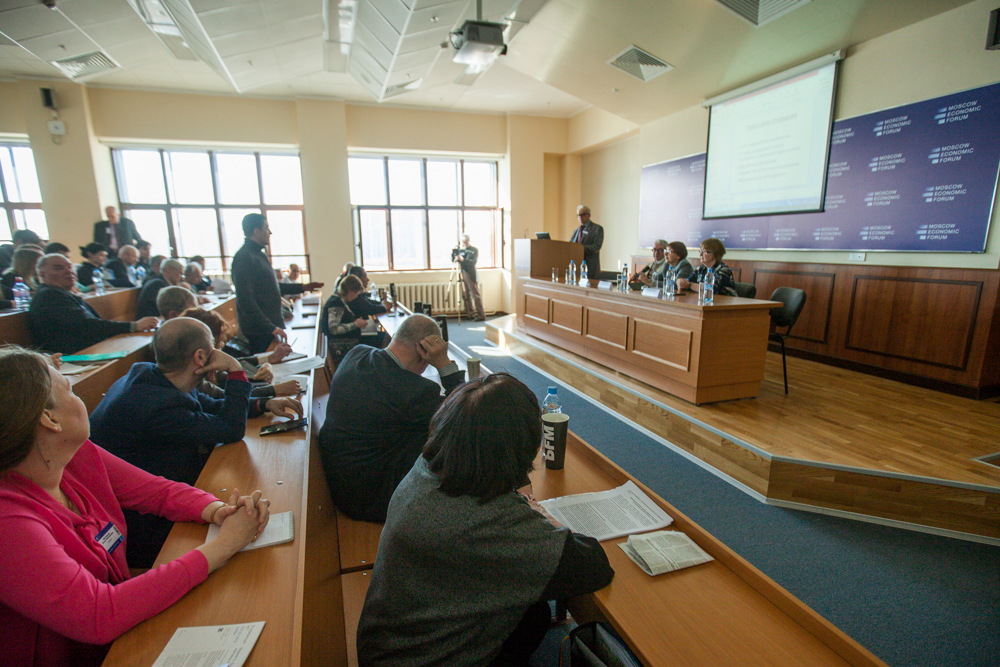
Published: March 23rd, 2016
Lomonosov housing MSU
Organizers:F. Ebert Foundation, the Moscow Financial and Law University
On the theme:
With the onset of the recent crisis, a sharp decline in oil revenues and not less rapid exhaustion of deferred "for a rainy day" stabilization fund resources has led to a drop in income and the reduction of economic opportunities of broad layers of the population. In these circumstances, the question of overcoming poverty and inequality and progress towards social justice will be inevitably put forward as a priority for both theoretical developments and practical for policy.
Among participants:
Olga Alexandrova, Galina Anisimova, Marina Baskakova, Bella Bataeva, Alexander Vasilevskiy, Michael Voeikov, Vladimir Golubev, Natalia Grigorieva, Hermann Dworczak, Victor Demin , Ruslan Dzarasov, Stella Dolmatova Ph.D., Irina Karavaeva, Olga Kislicina, Veniamin Livschitz, Valentinа Litvinenko, Valery Malashenko, Alexandrа Moskovskaia, Andrei Piatakov, Eduard Sobolev, Irina Soboleva, Mayrash Toksanbaeva, Jean Toshchenko, Jean Louis Tryuel, Guzel Ulumbekova, Alex Tsivenko, Tatiana Chubarova, Elena Shestakoba, Eberhard Schneider.
Moderators:
Michael Voeikov, Doctor of Economics, Professor, Head of sector of the Institute of Economics, RAS
Irina Soboleva, Doctor of Economics, Head of the Center of employment policies and social and labor relations at the Institute of Economics, RAS
Tatiana Chubarova, Doctor of Economics, Head of the Center of Economic Theory of the social sector the Institute of Economics, RAS
The protracted crisis contributes to the destabilization of economic and social life of the country. Priority issues to date, "Poverty. Wealth. Inequality: Causes and Alternatives "- presented in the conference title, which was held March 23, 2016 at the Moscow Economic Forum.
On the discussion platform urgent problems of reducing economic opportunities in times of crisis, falling incomes, increasing social inequality were hotly discussed . Valery Malashenko, Doctor of Economics, announced disappointing figures: "The minimum wage in Russia is 6224 rubles, a living wage - 9500 rubles. The maximum unemployment benefit - 4900, the minimum - 800 rubles. " Nearly 80% live in poverty, 30% - in poverty, said Malashenko.
The main cause of poverty and inequality in Russia by Lyudmila Rzhanitsina, Doctor of Economics, professor, chief researcher at the Institute of Economics, are low salaries. According to her, high salary means decent pensions, lack of child poverty, the development of economy. Therefore, the social policy should be aimed at increasing wages.
A serious problem for society, according to Jean Toshchenko, corresponding member of RAS, chief editor of Russian Academy of Sciences' Sociological Research" journal, Head of the Department of Theory and History of Sociology of Russian State Humanitarian University, are non-transparent working conditions. At the moment, in such circumstances are employed 38 million. The expert noted that a new class began to form in Russia - prekariat to which he refers temporary workers, part-timers, seasonal employment, people with unformed labor relations. "The Latin word" prekariat "- unstable, insecure. These groups largely characterized by precisely this precarious, unstable social situation "- Jean Toshchenko summed up.
A speach on the conference was made by Hermann Dvorak, coordinator of the European Social Forum. The expert spoke about the major crisis of capitalism, 2008-2009, as an example cited the situation in Greece, and also stressed that the alternative is to come from the community, to meet these challenges, relying only on the leaders, is impossible.
The problem of socio-economic inequalities in health status was marked by Olga Kislitsyna, PhD, Head of Sector of the Quality of Life Measurement Problems Institute of Economics. She talked about investigation, which revealed that the health of men is affected by the absence of luxury goods. Women's health is affected by the absence or deficiency of goods defining basic needs. Olga Kislitsyna explained that to improve the health of the population in Russia, it is necessary to carry out measures aimed at reducing social and economic inequalities. "The methods by which this can be done is well known, it has been tested in many countries. And the issue of their implementation is only a matter of political will "- the expert summed up.
The conference moderator Irina Soboleva , Doctor of Economic Sciences, Head of the Center of employment policies and social and labor relations at the Institute of Economics Academy of Sciences, drew attention to the poverty trap, which resulted in the affluent segments of the population having limited access to education and cultural benefits. Irina Soboleva noted that poverty traps exist in many countries, including in the West. The exception was the Soviet Union, where this phenomenon was basically absent. The so-called poverty trap arise from the commercialization in many areas, which will not be easy to overcome.
Venjamin Livshits, Doctor of Economic Sciences, Professor, Honored Worker of Science and Technology of the RSFSR gave specific proposals for exiting the economic and social crisis. According to him, it is necessary to change all the governance paradigm components: personnel, macroeconomic, fiscal policy.
Participants repeatedly emphasized that in order to successfully solve the problem of poverty and inequality only effort on the part of the state is not enough, the businesses and non-profit organizations should provide assistance, as well as the need to strengthen civil society and local initiatives, which should fight for their rights. Representatives of the scientific community came to a decision that to mitigate this situation, it is necessary to modernize social policy, review the sources on which the funding is carried out, to implement social support methods.
Source: PR department of MEF
Latest news
07.05.2018 MEF-2018: debate "Cultural policy: between individual freedom and the interests of society?"
07.05.2018 MEF-2018: Conference No. 8
07.05.2018 MEF-2018: Conference No. 4
07.05.2018 MEF-2018: Conference No.3
07.05.2018 MEF-2018: Conference No. 2
07.05.2018 MEF-2018: Conference No.1
26.04.2018 McConnell Discusses Information Warfare
20.04.2018 MEF-2018: closing plenary session
17.04.2018 Mr. Freysinger: «Skripal’s case» for relationship between Russia und European Union?
